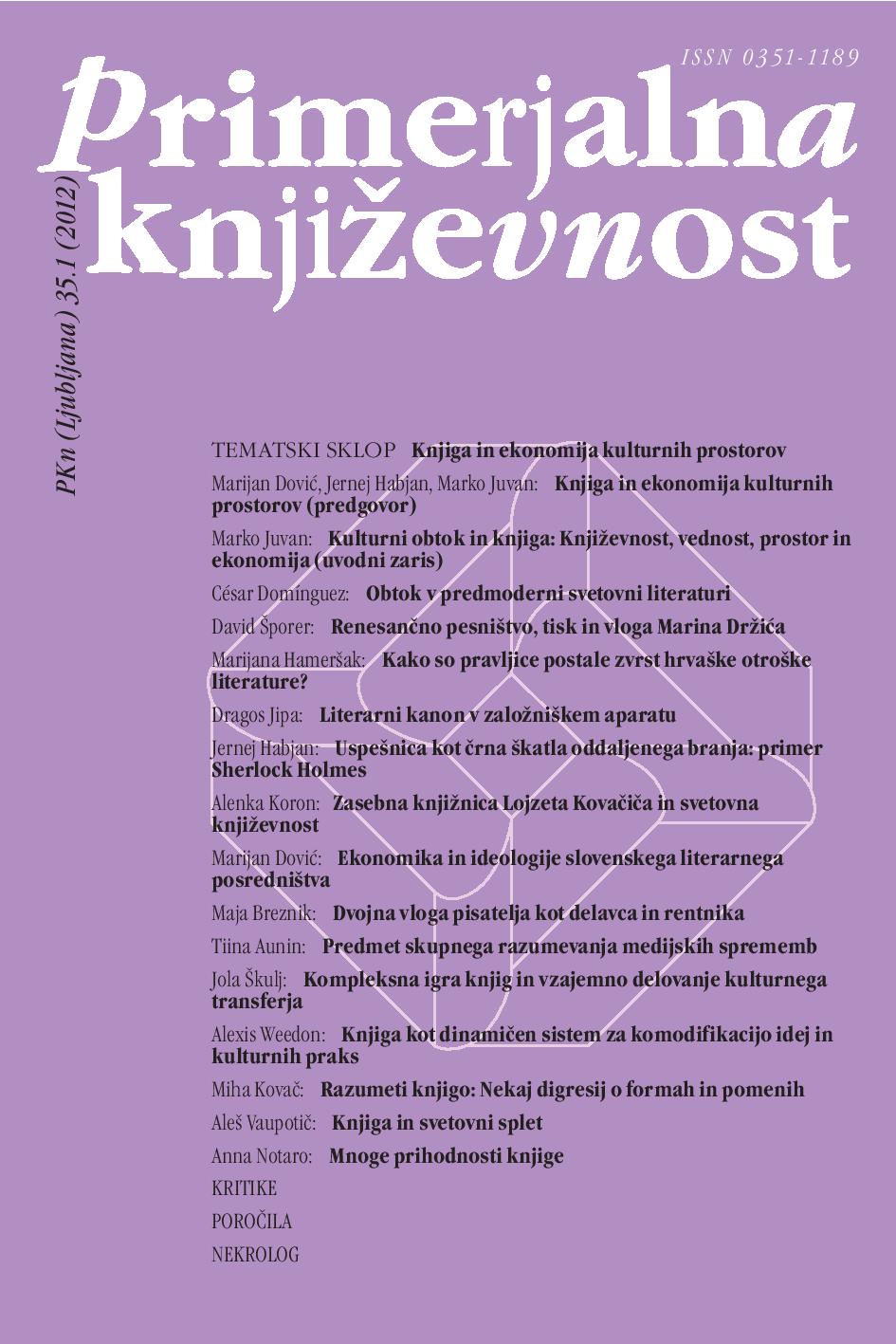The Bestseller as the Black Box of Distant Reading: The Case of Sherlock Holmes
Keywords:
literary history, distant reading, Moretti, Franco, detective fiction, Cartesian subject, Doyle, Arthur ConanAbstract
This article sketches out a possible solution to Franco Moretti’s problem of explaining the phenomenon of devices that preclude conscious perception and at once boost sales. By analyzing Moretti’s example of Conan Doyle’s clues as subjectivizing signifiers, and their enthusiastic early reception as a practice of a subjective fidelity to an artistic event, I see a properly scientific stance in Moretti’s reluctance to give a proposed scientistic account of this subjectivation.References
Althusser, Louis. Philosophy and the Spontaneous Philosophy of the Scientists, and Other Essays. Ed. Gregory Elliot; trans. Ben Brewster et al. London: Verso, 1990.
Aristotle. “Poetics.” Aristotle, The Complete Works of Aristotle. Ed. Jonathan Barnes. Vol. 2. Princeton, NJ: Princeton University Press, 1984. 2316–40.
Badiou, Alain: Ethics. Trans. Peter Hallward. London: Verso, 2001.
– – –. Second Manifesto for Philosophy. Trans. Louise Burchill. Cambridge: Polity Press, 2011.
Baggs, Chris. “How Well Read Was My Valley?” Book History 4 (2001): 277–301.
Bassett, Troy J. and Christina M. Walter. “Booksellers and Bestsellers.” Book History 4 (2001): 205–36.
Conan Doyle, Arthur. The Adventures of Sherlock Holmes. London: Smith, Elder, 1903.
– – –. Sherlock Holmes: The Complete Novels and Stories I. New York: Bantam, 1986.
Ducrot, Oswald: Le dire et le dit. Paris: Minuit, 1984.
Feyerabend, Paul: Against Method. London: Verso, 1993.
McDonald, Peter D. British Literary Culture and Publishing Practice, 1880–1914. Cambridge: Cambridge University Press, 1997.
McHale, Brian. Postmodernist Fiction. New York: Methuen, 1987.
Milner, Jean-Claude. “The Doctrine of Science.” Trans. Oliver Feltham. Umbr(a): A Journal of the Unconscious 6 (2000): 33–63.
Močnik, Rastko. “Toward a Materialist Concept of Literature.” Cultural Critique 4 (1986): 171–89.
Moretti, Franco. “Conjectures on World Literature.” NLR 1 (2000): 55–68.
– – –. “The End of the Beginning.” NLR 41 (2006): 71–86.
– – –. Graphs, Maps, Trees. London: Verso, 2005.
– – –. “More Conjectures.” NLR 20 (2003): 73–81.
– – –. “Moretti Responds (III).” Reading Graphs, Maps, Trees: Critical Responses to Franco Moretti. Ed. Jonathan Goodwin and John Holbo. Anderson, CA: Parlor Press, 2011. 105–07.
– – –. Signs Taken for Wonders. 2nd ed. Trans. Susan Fischer, David Forgacs, and David Miller. London: Verso, 2005.
– – –. “The Slaughterhouse of Literature.” MLQ 61.1 (2000): 207–27.
Price, Leah. “The Tangible Page.” London Review of Books (31 Oct. 2002): 38.
Sayers, Dorothy. “Aristotle on Detective Fiction.” English 1.1 (1936): 23–35.
Shklovsky, Victor. Theory of Prose. Trans. Benjamin Sher. Normal, IL: Dalkey Archive Press, 1990.
Žižek, Slavoj, and Rastko Močnik. “Spremna beseda.” G. K. Chesterton et al., Memento umori: teorija detektivskega romana. Ed. Slavoj Žižek and Rastko Močnik. Ljubljana: DZS, 1982. 295–348.


